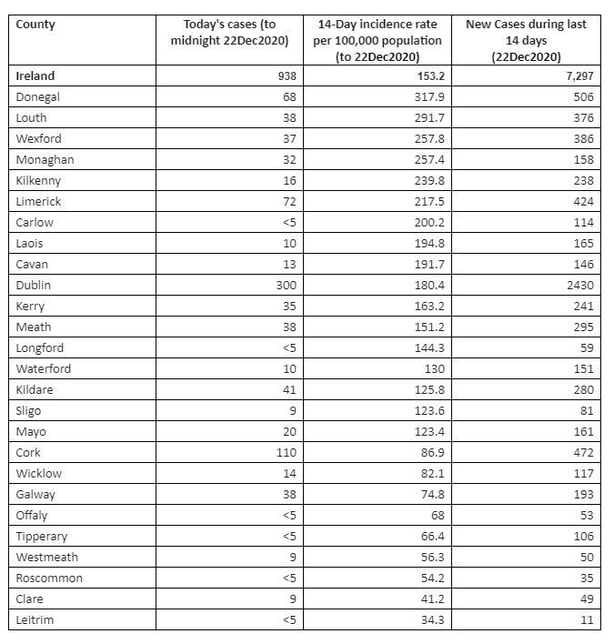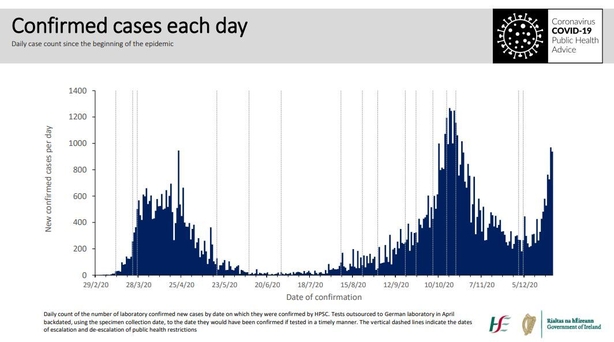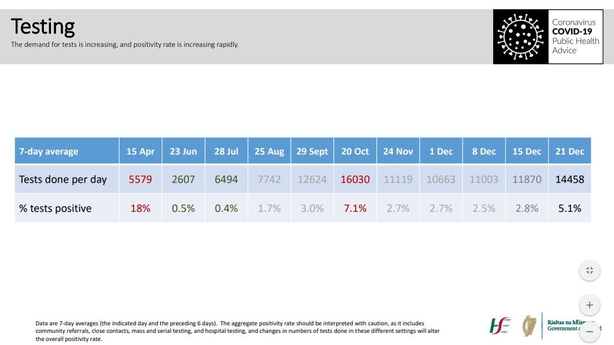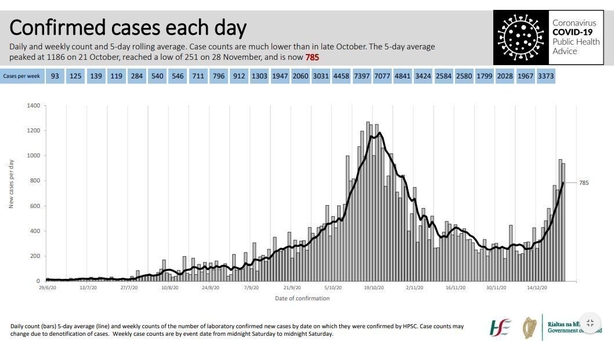The Department of Health has confirmed 938 more cases of Covid-19 and 13 further deaths, while health chiefs believe a new variant of the coronavirus found in Britain is now present in Ireland.
There have now been a total of 82,155 confirmed cases of Covid-19 and 2,184 deaths related to the virus in Ireland since the pandemic began.
The number of people in ICU is 25, down three from yesterday. As of 2pm today, 251 Covid-19 patients were in hospital.
There have been 24 Covid-related hospitalisations in the past 24 hours. The Health Protection Surveillance Centre has also denotified 11 confirmed cases.
Of today's cases, 416 are men and 517 are women and 65% are under 45 years of age. The median age is 36.
The regional breakdown showed 300 people tested positive in Dublin, with 110 in Cork, 72 in Limerick, 68 in Donegal, 41 in Kildare and the remaining 347 cases are spread across 21 other counties.
NPHET is calling for non-essential retailers to close after St Stephen's Day.
A letter containing the recommendation has been sent to the Department of Health tonight.
The current epidemiological situation is the most serious it has been since last March. The disease has spread across all parts of the country & across all age groups. Please act at all times as if you - or those you come into contact with - are infectious with #COVID19
— Dr Ronan Glynn (@ronan_glynn) December 23, 2020
Test samples also suggest a new variant of Covid-19 found in Britain is present in Ireland, but not solely responsible for a rapid spread in the disease.
The likely presence of the more infectious variant is based on preliminary data from a selection of samples from last weekend.
In a statement, the Director of the National Virus Reference Laboratory Dr Cillian de Gascun said: "Preliminary data would suggest, based on a selection of samples analysed from the weekend, that the novel variant from the UK is present in Ireland.
"However, given the timeline of the samples analysed, it would seem that the novel variant is not solely responsible for the recent increase in case numbers seen in Ireland."
We need your consent to load this rte-player contentWe use rte-player to manage extra content that can set cookies on your device and collect data about your activity. Please review their details and accept them to load the content.Manage Preferences
Speaking later at this evening's NPHET briefing, Dr De Gascun said they were waiting to confirm it was the variant strain.
He said: "Based on the epidemiology in the UK, based on the travel between the two countries, and based on the timeline, it's probable that those results will reflect the presence of the UK variant.
"Given the timing, it wouldn't in and of itself account for the significant increase in case numbers that we've found."
Dr De Gascun said based on very small numbers, the variant was mainly found in the east of the country. He said some tests suggest it was found in Dublin, but he could not be more precise than that.
He said that they currently did not know yet if someone who had caught Covid-19 already can get the new strain and he said that the new strain identified in South Africa and the new strain identified in Britain share common a mutation which has an impact on binding to respiratory cells and therefore impacts transmissability.

The Chair of the NPHET Irish Epidemiological Modelling Advisory Group said the number of cases had doubled in less than a week.
Also speaking at the NPHET briefing, Professor Philip Nolan said the epidemiological situation had deteriorated even in the 48 hours since Monday's briefing.
He said the most recent wave of the virus was rising as rapidly as the first back in March.
Speaking at the NPHET briefing, Professor Philip Nolan says the "epidemiological situation" has deteriorated further in the last 48 hours. | Read more: https://t.co/dFdUJRpUci pic.twitter.com/6oQsOy9kxS
— RTÉ News (@rtenews) December 23, 2020
Prof Nolan said that the reproduction rate is currently estimated at 1.5 to 1.8 and said if this continues there will be a significant number of cases in early January.
He said if the R-number is brought close to 1, there will be 1,000 cases a week in the new year, and if the R-number rises up even to 1.2 cases will rise up to 2,000 cases a day in February.
Prof Nolan said that the growth rate is effectively at its highest rate since March.
He said the 14-day incidence is 153 per 100,000 and, "very worryingly", there has been an increase in the numbers in hospital.

Prof Nolan said there were 22 hospitalisations per day on average, "up from what has been a stable 14 per day for quite a number of weeks now", with 24 admitted today.
He said ICU numbers are stable and declining slowly with just under 30 over the last week, but on average there have been two admissions, an increase in the number of admissions per day.
Prof Nolan said the number of deaths per day remains broadly constant at five to seven per day for well over six weeks now.
He said the demand for testing has increased very significantly, with 14,500 tests per day being done with a positivity rate of over 5%.
Yesterday, 20,000 tests were done and they had a positivity rate of 5.2%.

Prof Nolan said the five-day moving average is moving very rapidly. He said case numbers continue to rise in Dublin and the rest of the country and the growth rate in Dublin may be slightly higher than the rest of the country.
He said that the virus was increasing in all age groups and this was putting the most vulnerable at risk and said that older people were protected in the October and November period, but it is not the case now.
No outbreaks reported in restaurants in the last three weeks - HPSC data tonight pic.twitter.com/xLAmcuKOOS
— Fergal Bowers (@FergalBowers) December 23, 2020
Prof Nolan said we are beginning to see the number of patients and staff in healthcare settings becoming infected increasing, and we are also seeing the numbers of people in long-term care becoming infected increasing.
Speaking ahead of tomorrow's closure of pubs and restaurants, Chief Medical Officer Dr Tony Holohan said: "Every form of discretionary activity that we can each remove from our individual experiences now, in the days and weeks ahead will all contribute to limiting transmission.
"Revise your Christmas plans to ensure social contacts are limited and that hand hygiene, physical distance, ventilation and face covering measures are in place if you must have visitors to your home."

Read the latest coronavirus stories

